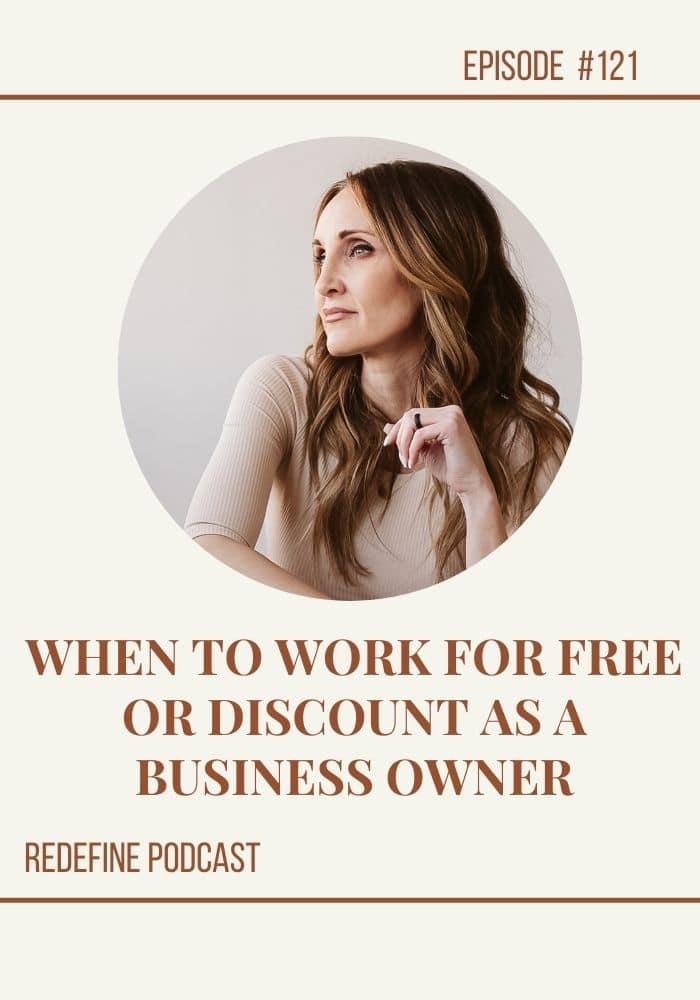
WHEN TO WORK FOR FREE OR AT A DISCOUNT AS A BUSINESS OWNER
As a business owner, the decision of whether to work for free or offer discounted services can be a complex one. On one hand, providing services at a reduced rate or pro bono can help build relationships, showcase expertise, and open doors to new opportunities. On the other hand, it’s essential to ensure that your time and expertise are valued appropriately to sustain your business and make money. In this podcast, I’ll discuss the factors to consider when deciding when to work for free or at a discount and how to strike the right balance.
Understanding the Value Exchange
Before diving into when to work for free or at a discount, it’s crucial to understand the concept of value exchange. Every business transaction involves an exchange of value between the provider and the recipient. While making money is awesome, there are other intangible benefits to consider, such as exposure, networking opportunities, and giving back to your community.
When to Work for Free
- Building Relationships: Working for free can be an effective strategy for building relationships with potential clients or partners. By offering your services as a gesture of goodwill, you can show your expertise, build trust, and establish a solid relationship with individuals or organizations that may lead to future paid opportunities.
- Showcasing Expertise: Sometimes, the opportunity to showcase your expertise and skills outweighs the immediate financial gain. Offering free services to high-profile clients or for important projects can serve as a powerful marketing tool, positioning you as an expert in your field and attracting attention from potential clients or collaborators.
- Supporting a Cause: Working for free can also be a way to contribute to causes or organizations that align with your values and mission. Pro bono work for nonprofit organizations, community initiatives, or charitable events allows you to make a positive impact while leveraging your skills and resources for the greater good.
With every business I’ve started, I’ve understood there’s a brand-building phase. I’ve said this many times that it doesn’t matter how amazing your product is, if you don’t have effective marketing, you’ll struggle.
When I started my first real business, my photography business, I’d recently moved to a new city. I did my market research, identified my ideal clients, and started growing my network. I shot for free for almost 8 months, but during this time, I was building relationships, showing my expertise, networking, and donating to local events. Just as I was beginning to get frustrated, my business exploded in the best way.
When to Offer Discounts
- Attracting New Clients: Offering discounts can be an effective strategy for attracting new clients, especially in a competitive market. Providing introductory offers or limited-time promotions can incentivize prospective clients to try your services and experience the value you provide, potentially leading to long-term relationships and repeat business.
When I have clients who are new in business and are trying to attract clients, I often recommend pricing themselves higher for what they want to charge and then offering a discount. This ensures that the new client understands what the investment is to work with you, so when they refer you, they don’t tell their network a lower investment, thus attracting clients who aren’t willing to invest. - Fostering Loyalty: Discounts can also be used as a tool for fostering loyalty and rewarding existing clients or customers. Offering special discounts or loyalty rewards to repeat customers not only encourages repeat business but also strengthens the relationship and encourages referrals.
- Fill in Slow Periods: During slow periods or off-peak seasons, offering discounts can help stimulate demand and fill in gaps in your schedule. By strategically discounting your services during these times, you can maintain cash flow, keep your team engaged, and maximize utilization of resources.
Striking the Right Balance
While working for free or offering discounts can bring benefits, it’s essential to strike the right balance to ensure that your business remains sustainable and profitable in the long run.
Here are some tips for finding that balance:
- Set Clear Boundaries: Define clear criteria for when you’re willing to work for free or offer discounts. Consider factors such as the potential for future paid work. Remember: When you say yes to one thing, you’re saying no to another. Often, when we don’t set clear boundaries, we feel resentful. A good example of this is when friends and family want to use your services or products. We often feel obligated to offer a discount (or even do it for free), but we may feel underappreciated or undervalued and then resentment sneaks in. Set clear boundaries from the beginning, and you can avoid a lot of negative feelings.
- Communicate Value: When offering discounted or free services, emphasize the value that clients or customers will receive. Clearly articulate the benefits of your services and why they’re worth investing in, even at a reduced rate. If you decide to trade, make sure you communicate and track hour for hour and that the other person understands the value they’re getting.
- Limit Free Work: While occasional pro bono work can be beneficial, be cautious not to devalue your expertise or undermine your worth by consistently working for free. Set limits on the amount of free or discounted work you’re willing to do, and ensure that it aligns with your overall business strategy.
- Upsell and Cross-Sell: When offering discounts, consider opportunities to upsell or cross-sell additional services or products. By bundling services or offering complimentary add-ons at full price, you can maximize the value of the transaction and offset any discounts provided.
The decision of whether to work for free or offer discounted services is one that requires careful consideration of various factors. While there are benefits to providing services at reduced rates or pro bono, it’s essential to ensure that your time and expertise are valued appropriately to sustain your business and maintain profitability. By understanding the value exchange, knowing when to work for free or offer discounts, and striking the right balance, you can leverage these strategies effectively to grow your business, build relationships, and make a positive impact in your industry.
Resources:
The Meeting Place Membership
Rock The Reels
1:1 Coaching
Free Client Welcome Guide
Additional Trainings and Resources
Connect with Brittni:
Follow me on the Gram – @brittni.schroeder
Join my Facebook Group
Visit my website
Subscribe to my Youtube








